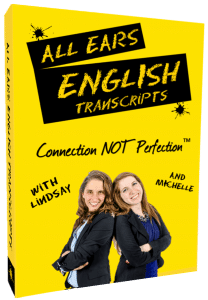
Do you know how to use the “zero conditional” in English?
You may not have heard of the zero conditional in English, as it is a grammar-based sentence structure.
It may help to see this in the form of an example so let’s take a look at this one:
“If I don’t eat every 3 or 4 hours, I get really grumpy!”
We’ve talked about other conditionals and so to wrap up this series we’re looking at the zero conditional.
This is a conditional based on truths, and that’s the important thing to remember here.
We’re going to look at this conditional, how it is based upon truths, how this works in conversation, and why it matters.
Get Your Transcripts Today!

Make sure you understand every word you hear on All Ears English.
Bring your English to the advanced level with new vocabulary and natural expressions.
Subscribe and get the transcripts delivered by email.
Learn to speak naturally with the American accent.
Click here to subscribe and save 50%
Looking At This Type of Statement
We have done episodes about the 1st, 2nd, and 3rd conditional and so we’re going to look at the zero conditional now.
Here is the example again: “If I don’t eat every 3 or 4 hours, I get really grumpy.”
In this statement, you are telling something that is true and factual.
IF the first situation happens, then the other will generally happen.
This conditional is about truth, and it is an outcome of the first thing happening.
This can be about things that are generally true or even scientific facts.
There is evidence or truth and therefore one will cause the other to automatically happen.
Looking At The Grammar of This
Let’s look at the grammar structure.
This may seem overwhelming at first, but it’s easy enough if you break it down to really understand it.
If clause, and then main clause are both in present simple.
You can replace “if” with “when” in these sentences and you’ll be just fine.
So you could say “When I don’t eat every 3 or 4 hours, I get really grumpy.”
You might find that you generally use “if” more than “when” in these sentences, but it’s something to experiment with.
This is all about grammar and word choice, and it plays a very important part in your conversations.
This is a conditional that you will likely use a lot, and now you may be much more in tune to it.
When you start to understand the grammar structure, you really pick up on it in conversation more.
Some Good Examples To Demonstrate
There are examples of this conditional all around you.
It’s a matter of looking at what the truths are and then using these to illustrate your point.
There are examples of this if you look around and figure out how this conditional applies.
Let’s look at some examples of this in everyday life:
- Truths About Your Life or The World: This may be a truth that is specific to you. It may be a truth about your world or something that nearly everyone experiences.
If it gets too hot outside, I secretly hope for rain.
If my son cries, I try to comfort him right away.
- Sharing Something About Yourself: These are facts about yourself that you are trying to share with somebody. This may be with somebody new or it may be a new fact about you that somebody close to you learns.
L: So do you like to take road trips?
M: No! If I’m in the car too long, I throw up!
M: How long does it take you to get to work?
L: If I leave on time, it takes me 20 minutes. If I leave late, it takes me 45!
- Science or Scientific Facts: These are factual based statements that can’t be disputed. They exist, they are real, and they are facts about the world that nobody can argue with. This is science and therefore these things really truly happen.
If you heat ice, it melts.
If you water flowers, they grow.
If you freeze water, it becomes ice.
If you don’t drink water, you become dehydrated.
- General Directions: These are directions that you give or that you are provided with. You want to follow these to get a desired outcome or take care of something or someone.
L: So how often should I wash these windows?
M: I do three times a week. If I wash the windows any less than 3 times a week they start to look really bad.
These are all the types of situations or examples that you would expect to use the zero conditional in.
When Will You Need This?
So in what situations will you find yourself needing the zero conditionals?
In connection, you may use the zero conditional to share information about yourself or your life.
It’s about sharing truths, and therefore it’s quite important in English conversation.
The science part could be in a discussion about health, a cooking class, other types of classes, or times when instructions are given.
The main thing is to recognize that the zero conditional is all based in truths.
These are actual outcomes that will occur given the condition.
Roleplays Always Help
This is the best way to grasp a new concept and understand what it really means.
This roleplay will help you to see how this conditional works in everyday conversations.
The situation: Lindsay is teaching Michelle how to make a really great sandwich.
M: So how long should I toast the bread for?
L: 3 minutes. Toast burns if you toast it for too long.
M: Okay and which meat should I use?
L: I like turkey, but that’s just me. When I eat only veggies I don’t feel full.
M: Okay.
L: And don’t forget the mustard. If you don’t use mustard the bread gets too dry.
Takeaway
This is the conditional of general truths, and that’s a great way to think about it.
Listen to all of the conditional episodes so that you have a true understanding here.
Grammar is useful to your life ,and it’s really helpful when you can see it at work in conversation.
How can you use this conditional?
Practice with it and see how it can be useful and help you with connections, all under the context of proper grammar.
Don’t forget to check out our other episodes on the conditionals including the third conditional and the “lottery conditional.”
If you have any questions, please leave them below in the comments section.
We’ll get back to you as soon as we can.








